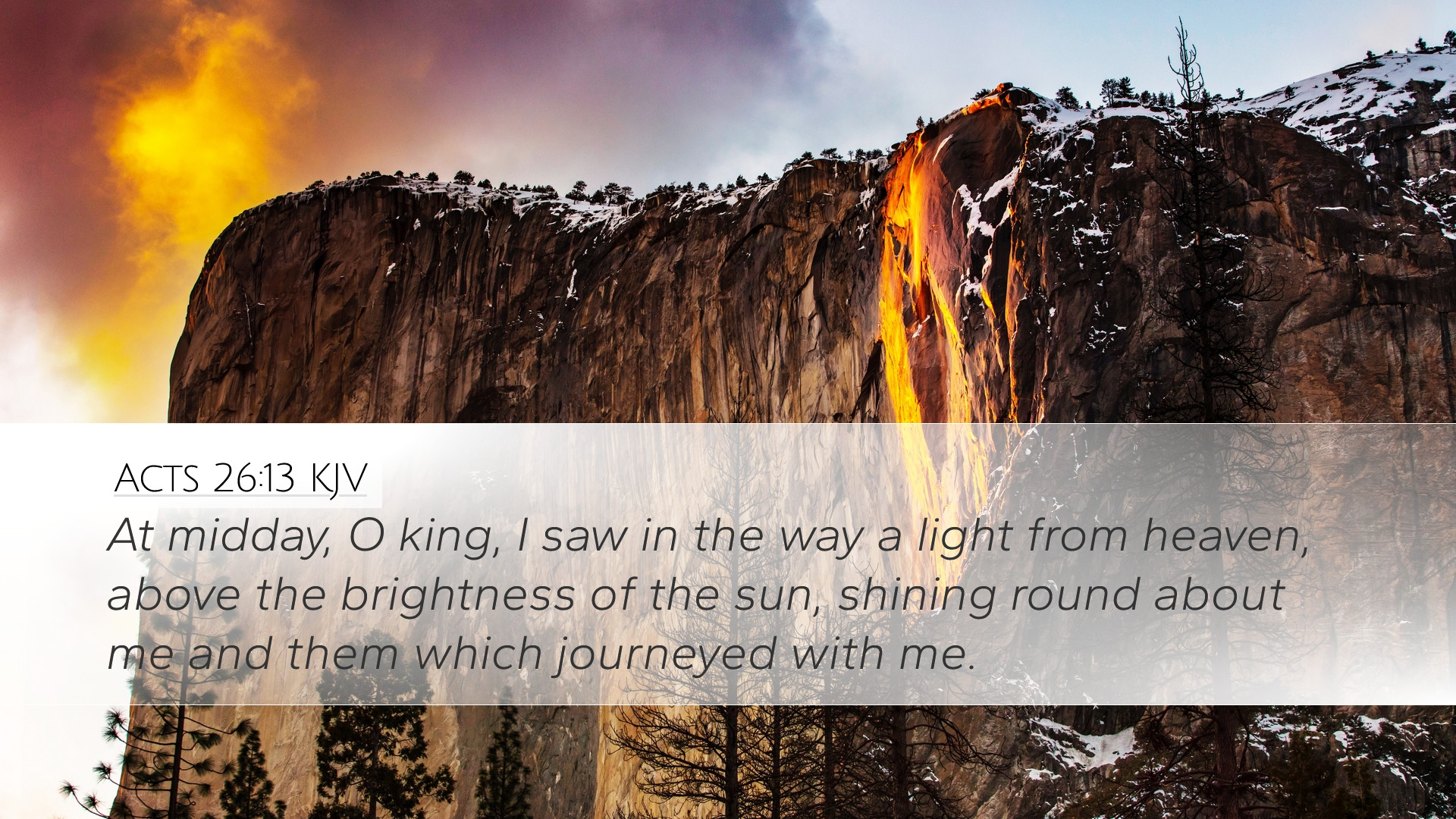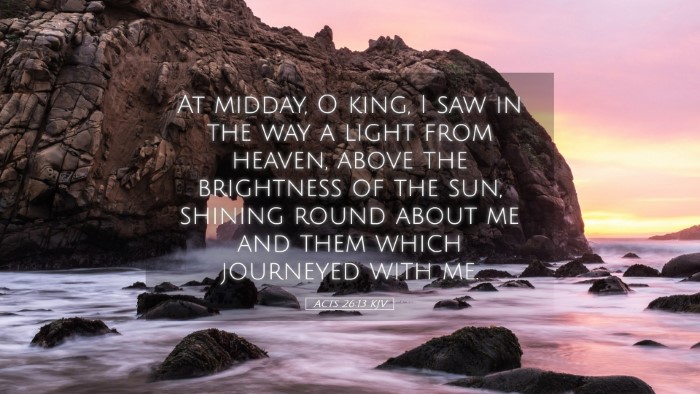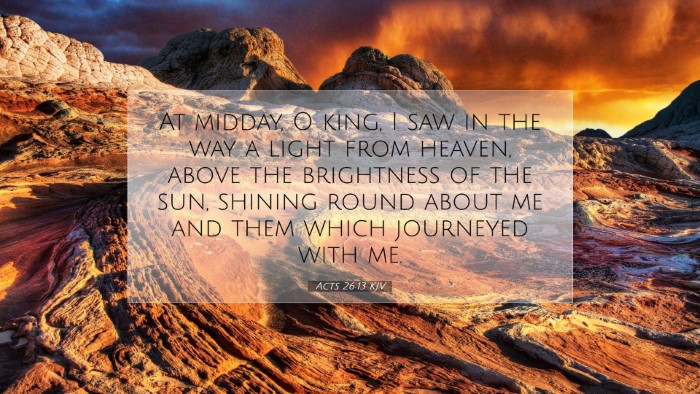Commentary on Acts 26:13
Text of the Verse: “At midday, O king, I saw in the way a light from heaven, above the brightness of the sun, shining round about me and them which journeyed with me.”
Introduction
The account of Paul's conversion is one of the cornerstone events in the New Testament, found in Acts 9, 22, and 26. In Acts 26:13, Paul recounts his experience on the road to Damascus where he encountered the risen Christ. This commentary synthesizes insights from various public domain sources to elucidate the significance of this profound moment.
Contextual Background
Before diving into the specifics of Acts 26:13, it is essential to grasp the broader context of Paul's life and ministry. As a Pharisee, Paul (then Saul) was a fierce persecutor of Christians. His dramatic conversion not only transformed his life but also set the stage for the spread of Christianity throughout the Roman Empire.
Historical Context
- The Persecutor of Christians: Paul's background as Saul of Tarsus is crucial. He was well-versed in Jewish law and zealous in his faith, which he interpreted as a mandate to eradicate followers of Jesus.
- The Significance of His Roman Citizenship: Paul’s status enabled him to engage with both Jewish and Gentile audiences, facilitating the spread of the Gospel beyond the Jewish community.
The Encounter with Christ
Acts 26:13 marks the pivotal moment of Paul's encounter with Christ. This experience is rich with theological implications and personal transformation.
Analysis of the Text
- “At midday, O king”: The phrase denotes the time of day, indicating visibility and a significant context for the supernatural event. Mathew Henry emphasizes the importance of midday as a time when the sun is at its zenith, symbolizing the literal and metaphorical ‘light’ of divine revelation.
- “A light from heaven”: This divine light signifies the presence of God and the truth of Christ. Adam Clarke notes that heavenly light often represents the truth breaking through darkness, highlighting the transformative power of God’s revelation.
- “Above the brightness of the sun”: The hyperbolic comparison underscores the transcendence of God’s glory. Albert Barnes points out that the light was not only brighter but also distinct in its source, reinforcing Paul’s encounter as utterly unique and otherworldly.
- “Shining round about me and them which journeyed with me”: The inclusive nature of this experience suggests that while some would later reject the message, the presence of God was tangible. Matthew Henry notes this as a renewed call to accountability before God, as it highlights the idea that no one is exempt from the revelation of Christ.
Theological Implications
This verse embodies several theological themes that are vital for understanding Paul's subsequent ministry and the nature of divine revelation.
Revelation and Response
The experience on the road to Damascus reveals the pattern of divine revelation followed by a human response. Paul’s journey illustrates a critical moment where an encounter with the divine necessitates a response—a theme echoed throughout the Scriptures.
The Power of Light Versus Darkness
Paul’s encounter symbolizes the larger biblical theme of light overcoming darkness. The light represents not just knowledge but also moral and spiritual clarity that comes from Christ, as emphasized by Adam Clarke in his exploration of light as a metaphor for divine truth and revelation.
Transformation and Commission
The transformative nature of this encounter cannot be overstressed. As Paul was called out of darkness into light (Acts 26:18), he was simultaneously commissioned for a mission that would take him throughout the known world, heralding the Gospel.
Practical Applications for Believers
This encounter and its recounting present several applications for believers today.
Personal Encounter with Christ
Pastors and theologians should emphasize the necessity of personal encounters with Christ, akin to Paul’s experience. It serves as a reminder that each believer is called into a relationship with Christ characterized by transformation and mission.
The Importance of Clarity in Witness
In ministry, clarity in communicating the message of Christ is paramount. Paul’s compelling story demonstrates how personal experiences can powerfully convey the truth of the Gospel when shared with authenticity.
The Call to Boldness in Proclamation
As seen in Acts 26, Paul was unabashed in proclaiming the truth of his conversion. This prompts modern believers to consider their own boldness in sharing the Gospel amidst hostility or skepticism.
Conclusion
Acts 26:13 encapsulates vital truths about divine revelation, personal transformation, and the mission of Christians. The insights from Matthew Henry, Albert Barnes, and Adam Clarke together paint a vivid picture of the significance of Paul’s encounter with Christ. For pastors, theologians, and believers, this verse serves as a powerful reminder of the light of Christ breaking into the darkness of the world, calling all to respond to that glorious revelation.
Keywords for Further Study
- Divine Revelation
- Christian Transformation
- Theological Implications of Light
- Pauline Theology


